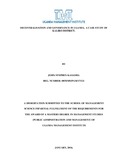DECENTRALISATION AND GOVERNANCE IN UGANDA. A CASE STUDY OF KALIRO DISTRICT.
Abstract
The study assessed the role of decentralization in promoting good governance in Uganda with
reference to Kaliro District. It investigated the effect of decentralization in promoting community
participation in development activities; the role of decentralization in promoting transparency and
accountability in leadership and local capacity to participate in development programmes; and
moderating effect of locality factors on decentralization in promoting good governance. It was a
case study that used questionnaires, interview guides, Focused Group Discussion and
Documentation review guide to investigate a sample of 231 respondents. Main findings were that:
Decentralization promotes community participation in developmental activities in localities like
in budgeting, setting priorities, electing their leaders, managing their own affairs. Decentralization
makes it possible for the mobilization of the local potential in terms of skills and resources to
effectively deliver services. Major findings were that; decentralization has a significant effect on
community participation (R2 =0.45; N = 135, P-value<0.05); decentralization plays a role in
promoting accountable leadership in local governments (R2 =0.032; N = 135, P-value<0.05); It
promotes local capacity to participate in development programmes(R2 =0.012; N = 135, P
value<0.05); and locality factors have an effect of 42.8% towards governance (B =0.428; N =
135, P-value<0.05). Conclusions were that devolved power is less meaningful/purposeful;
inadequate empowerment affects local revenue mobilization; low literacy levels affect the local
people’s confidence in decision making; negative attitude of the local people hinders their
perception towards development; rampant vice of corruption and an ineffective Civil Society
hinders decentralization effectiveness.On the other hand, major recommendations were that; Local
governments should involve the marginalized and vulnerable groups in all programs; should
strengthen a clearly defined self-enforcing central-local government relationship designed on a
principal of mutual mandates; should improve on the literacy levels through FAL and embracing
meaningful UPE and USE to produce holistic educated citizens.

